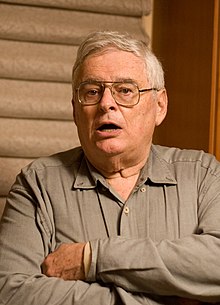Jerry A. Fodor
| Jerry Alan Fodor | |
|---|---|
 |
|
| Born | 1935 (age 81–82) New York City, New York, United States |
| Alma mater |
Columbia University Princeton University |
| Awards | Jean Nicod Prize (1993) |
| Era | 20th / 21st-century philosophy |
| Region | Western Philosophy |
| School | Analytic |
|
Main interests
|
Philosophy of mind Philosophy of language Cognitive science Rationalism Cognitivism Functionalism |
|
Notable ideas
|
Modularity of mind Language of thought |
|
Influences
|
|
|
Influenced
|
|
Jerry Alan Fodor (/ˈfoʊdər/; born 1935) is an American philosopher and cognitive scientist. He holds the position of State of New Jersey Professor of Philosophy, Emeritus, at Rutgers University and is the author of many works in the fields of philosophy of mind and cognitive science, in which he has laid the groundwork for the modularity of mind and the language of thought hypotheses, among other ideas. He is known for his provocative and sometimes polemical style of argumentation and as "one of the principal philosophers of mind of the late twentieth and early twenty-first century. In addition to having exerted an enormous influence on virtually every portion of the philosophy of mind literature since 1960, Fodor's work has had a significant impact on the development of the cognitive sciences."
Fodor argues that mental states, such as beliefs and desires, are relations between individuals and mental representations. He maintains that these representations can only be correctly explained in terms of a language of thought (LOT) in the mind. Furthermore, this language of thought itself is an actually existing thing that is codified in the brain and not just a useful explanatory tool. Fodor adheres to a species of functionalism, maintaining that thinking and other mental processes consist primarily of computations operating on the syntax of the representations that make up the language of thought.
...
Wikipedia
